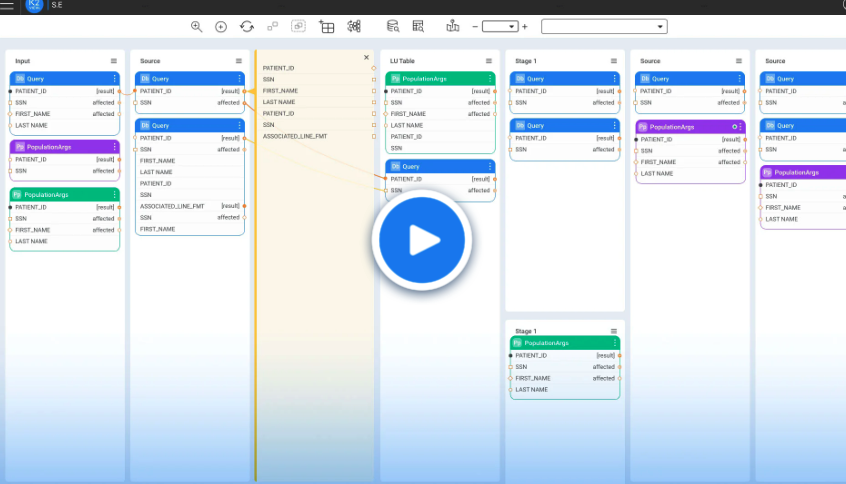Informatica released its end-of-life schedule for its on-prem TDM, leaving users with no choice but to migrate to its cloud-based solution, or find a new one.
-
Migration (not transition)
There’s nothing smooth about migrating to Informatica Cloud Test Data Management from its on-prem test data management solution since it’s essentially a rip-and-replace procedure. Current users should consider the full range of alternative solutions, that may be more cost-effective and better prepare them for evolving technologies.
Recommendation: Make sure your test data management solution supports ALL environments: on-prem, cloud, or hybrid.
-
Immature Technology
Users have reported in peer review sites that Informatica Cloud Test Data Management is lacking functionality that may have existed in the on-prem version. For example, it has difficulty connecting with cloud apps, like Snowflake and S3. Issues were also reported with Parquet files, Athena Data Catalog, SQL override and transformation, and more.
Recommendation: Choose a test data management solution that's been field-tested at global tier-1 enterprises for years, with correspondingly positive peer reviews.
-
Integration Issues
Enterprises have a wide array of modern, complex, and legacy data sources that ought to be supported by their test data management tools. Informatica cloud users report limitations around IMS mainframes, as well as many other data sources not supported “out of the box”. Database integration often requires extensive professional services from Informatica to implement. Such rigidity could result in partial data coverage, ending in poor test coverage and slower application releases.
Recommendation: Consider an open test data management solution, with hundreds of connectors to ANY data source system.
-
Unpredictable Pricing
Informatica Cloud Test Data Management is now SaaS-based, with their standard “perpetual license and maintenance” model no longer valid. Understanding the new consumption-based SaaS model is very complex, requiring a workshop just to receive an estimate. Budgeting is difficult, if not impossible, because the more you use, the more you pay. The new pricing model factors in:
-
Platform usage
-
Data usage (the quantity of records processed)
-
Compute hours
-
Events
Cloud-adopters report a significant increase in their TCO.Recommendation: Look for a test data management solution with the most simple and predictable cost structure, a history of fair pricing practices, and excellent customer references.
-
-
Limited Functionality
Given the fact that current on-prem users must purchase Informatica Cloud Test Data Management by 2024/25 at the latest, they have the unique opportunity of switching to newer test data management software with significantly more functionality, including:
-
Integration with any data source
-
Comprehensive test coverage and role-based access
-
Easy-to-use, self-service provisioning tool with full TDM functionality
-
Built-in data masking and synthetic data generation
-
Recommendation: Seek out a test data management solution that can integrate with all your data sources and includes all functionality under one license.
-
Negative Peer Reviews
Below are quotes from Gartner Peer Reviews on Informatica Cloud Test Data Management from Q4 2022:
a. “It is hard to manage dependencies for applications when implementing a data masking capability.” (November 28, 2022)
b. “Needs training to get used to it. Spatial data handling can be improved. Documentation is not up to the mark.” (November 29, 2022)
c. “[Limited] integration with other tools, reporting and customizations.” (December 1, 2022)
d. “When the IPUs are not used, [the credit does] not carry forward to next month: Should improve on flexibility.” (December 2, 2022)
e. “It is still not where it needs to be, compared to other cloud database vendors, and [to the] achievements they have made in the past 2 to 3 years.” (December 3, 2022)
f. “We need to buy something called Informatica Processing Units (similar to Azure Computing Units) each month which cannot be carried forward to subsequent months. Not many organizations are using it, so peer support is somewhat limited. Informatica has another [separate] product for data governance.” (December 5, 2022)
A March 2023 PeerSpot reviewer of Informatica Cloud Test Data Management wrote:
“One thing Informatica could improve is the way IPUs are used. Each customer purchases a certain amount of IPUs per month, but you can use more or less than that defined quantity. The only problem is if you don't use all your IPUs, they don't carry over into the next month. I think customers should have the ability to transfer unused IPUs into the next month or year. This improvement could help give customers more flexibility, especially since cloud solutions need flexibility in how we use and pay for them.”
Conclusion
Test data management professionals should consider the following factors associated with cloud-based test data management before transitioning to Informatica Cloud Test Data Management:
-
Challenging transition
-
Immature technology
-
Limited functionality
-
Data source integration issues
-
Unpredictable pricing
-
Negative peer reviews
So, if the “transition” is actually a “rip-and-replace” procedure, on-premise users should evaluate the top test data management tools for 2024, to determine which TDM tool is most appropriate for their specific needs.













